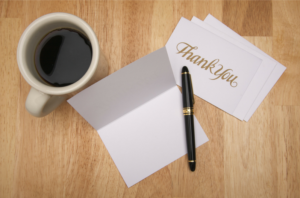INSIDE THE 
NEWS + ADVICE
How a Thank You Can Lead to a Job Offer
 Yes, interviews are much more informal than they were even 10 years ago, but some things remain musts, including follow-up thank yous.
Yes, interviews are much more informal than they were even 10 years ago, but some things remain musts, including follow-up thank yous.
That doesn’t mean a hastily written email or a quick “thanks” on the way out the door but rather a proper note on quality stationery or a carefully crafted email.
Why bother? It’s a simple way to show the interviewer you’re a professional. It also keeps your name in front of decision makers and allows you to underscore points that may tilt the odds for landing the job in your favor. That’s a major payoff for a few minutes of time.
There are tricks to making sure your thank you is appropriate and works the magic you intend. Consider these ideas to craft a thank you with punch –
- Take notes. You should always take notes during a job interview, even if it’s on a pocket-sized paper notepad. Not only will it underscore that you’re serious about the job, but it will help you remember key issues discussed and buzzwords used. You’ll likely want to mention at least a few of those points when you write the thank you. Caution: Don’t become so engrossed in writing notes that you fail to make eye contact and engage with the interviewer. That’s one gripe some hiring managers have, especially with younger job seekers. If you aren’t a speedy writer and think an important point was made, say something like “I want to remember those three crucial tasks of the job. Let me write those down please.” Interviewers know you’re likely nervous and will appreciate your thoroughness. It underscores that you will be detailed-oriented on the job, too.
- Collect business cards. You should write down the names of those with whom you speak, but don’t just rely on your notes. You could have misheard a name or spelled it incorrectly. There’s nothing worse than writing a thank you to “Linda Riley” and finding out later she spells her name “Lynda Reilly.” Or thanking “Dan” who is actually “Don.” If you forgot to ask for a business card and must rely on your notes, confirm the spelling of the person’s name through the company website or by calling the main number.
- Buy professional stationery. If you decide to write a hand-written note, this isn’t the time to make due with the old note cards you have stashed in your desk. Buy small (usually 5” x 7”) cards. You want ones that are plain and dignified. No flowers, funny sayings or photos of dogs on the front!
- Use a professional email address and signature line. It’s fine to send an email thank you as long as it’s professional. Doing so allows the recipient to easily share your message with others. Don’t write to a potential employer from an account with a quirky email address — I had one prospective employee write a thank you note from the email address “Elvis Lives”. Take a few seconds and establish an account with your given name. And, of course, don’t include quotes, cartoons, emoticons or any other personal monikers (Joe “Ironman” Smith) in the message.
- Write individual thank yous to the main people with whom you interviewed. If you spent a few minutes chatting with the manager of a different department or another employee you needn’t write to them. But if you met for more than 5 minutes with someone, it’s a good idea to write a personal note to that person.
- Keep the message brief, specific and legible. This isn’t the time to dash it off while sitting in your car or as you eat breakfast. Instead carve out 15 minutes – that’s all it should take – to sit down with your interview notes. Write a thank you to each person thanking him or her for their time, expressing your interest in the company and underscoring one point you’d like them to recall about your candidacy. An example might be: “Dear Dr. Collins, Sincere thanks for meeting with me on Wednesday. I appreciate the time you spent detailing the job duties for which I’d be responsible if you were to offer me the job. It was especially interesting to hear that you have a focus on defeating Android malware. As you likely recall, I have a great personal interest and two years professional expertise in that area.”
- Proofread. Carefully proofread each thank you before you hit “send” or mail it. Typos signal that you are disinterested and lack attention to detail.
- Promptness counts. You should send thank yous within 48 hours of leaving the interview. Doing otherwise could show you don’t have a keen interest in the job.
When you interview for a job, setting yourself apart – in a positive way – can make the difference between landing a job or not. Thank yous are an easy and quick way to do just that.
This entry was posted on Monday, August 14, 2017 7:45 am
